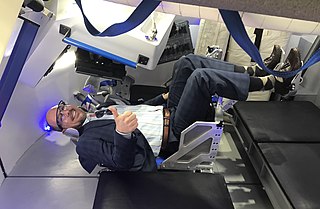
Clarence William Nelson II is an American politician and attorney serving as the administrator of the National Aeronautics and Space Administration (NASA). Nelson previously served as a United States senator from Florida from 2001 to 2019. A member of the Democratic Party, he previously served in the Florida House of Representatives from 1972 to 1978 and in the United States House of Representatives from 1979 to 1991. In January 1986, Nelson became the second sitting member of U.S. Congress to fly in space, after Senator Jake Garn, when he served as a payload specialist on mission STS-61-C aboard the Space Shuttle Columbia. Before entering politics he served in the U.S. Army Reserve during the Vietnam War.

John Robert Bolton is an American attorney, diplomat, Republican consultant, and political commentator. He served as the 25th United States Ambassador to the United Nations from 2005 to 2006, and as the 26th United States National Security Advisor from 2018 to 2019.

Charles S. "Chuck" DeVore is an American politician who served as a Republican member of the California State Assembly from 2004 to 2010 when he lived in Irvine and represented the 70th District, which includes portions of Orange County. DeVore was Vice Chair of the Assembly Revenue and Taxation Committee as well as Vice Chair of the Veterans Affairs Committee. He also served on the Budget Committee and was a member of the Joint Legislative Audit Committee. After losing a 2010 bid for Republican nomination for the United States Senate, in 2011 DeVore moved to Texas to work for the Texas Public Policy Foundation where he is now Vice President for National Initiatives.

Peter Kent Navarro is an American economist who served in the Trump administration, first as Deputy Assistant to the President and director of the short-lived White House National Trade Council, then as Assistant to the President, Director of Trade and Manufacturing Policy in the new Office of Trade and Manufacturing Policy; he was also named the national Defense Production Act policy coordinator. He is a professor emeritus of economics and public policy at the Paul Merage School of Business, University of California, Irvine, and the author of Death by China, among other publications. Navarro ran unsuccessfully for office in San Diego, California, five times. Navarro, who sought to overturn the 2020 presidential election, is the only former White House official ever imprisoned on a contempt-of-Congress conviction.

The National Space Council is a body within the Executive Office of the President of the United States created in 1989 during the George H. W. Bush administration, disbanded in 1993, and reestablished in June 2017 by the Donald Trump administration. It is a modified version of the earlier National Aeronautics and Space Council (1958–1973).
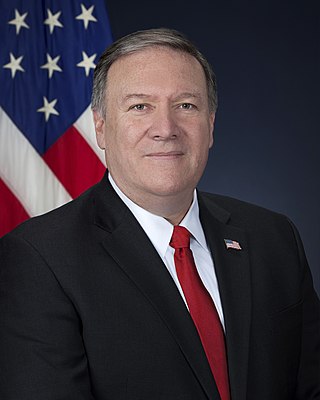
Michael Richard Pompeo is an American politician who served in the administration of Donald Trump as director of the Central Intelligence Agency (CIA) from 2017 to 2018 and as the 70th United States secretary of state from 2018 to 2021. He also served in the United States House of Representatives from 2011 to 2017.

Brett P. Giroir is an American pediatrician. He was formerly the U.S. assistant secretary for health, a four-star admiral in the U.S. Public Health Service Commissioned Corps and an acting Food and Drug Administration commissioner.
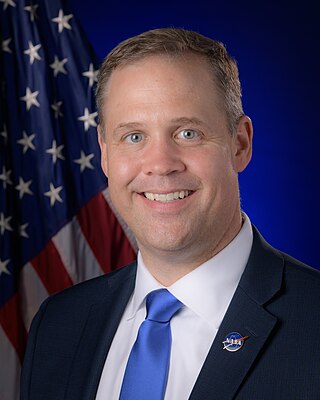
James Frederick Bridenstine is an American military officer and politician who served as the 13th administrator of the National Aeronautics and Space Administration (NASA). Bridenstine was the United States representative for Oklahoma's 1st congressional district, based in Tulsa from January 3, 2013, to April 23, 2018. He is a member of the Republican Party. Bridenstine currently works in the private sector and holds positions at Voyager Space Holdings, Viasat, Acorn Growth Companies and Firefly Aerospace.

Avril Danica Haines is an American lawyer and senior government official who serves as the director of national intelligence in the Biden administration. She is the first woman to serve in this role. Haines previously served as Deputy National Security Advisor and Deputy Director of the Central Intelligence Agency (CIA) in the Obama administration. Prior to her appointment to the CIA, she served as Deputy Counsel to the President for National Security Affairs in the Office of White House Counsel.

Jeffrey James DeWit is an American businessman and politician who served as the chair of the Arizona Republican Party from January 2023 to January 2024. A member of the Republican Party, DeWit became the State Treasurer of Arizona in 2015, succeeding Doug Ducey. DeWit said in 2016 that he did not plan to seek re-election in 2018. In 2017, President Trump nominated him to be chief financial officer of NASA. His nomination as chief financial officer of NASA was confirmed by the U.S. Senate in March 2018. He resigned from NASA in February 2020 and joined Trump's 2020 campaign later that year.

Donald Trump assumed office as president of the United States on January 20, 2017, and his term ended on January 20, 2021. The president has the authority to nominate members of his Cabinet to the United States Senate for confirmation under the Appointments Clause of the United States Constitution.

This is a list of political appointments of current officeholders made by the 45th president of the United States, Donald Trump.

Robert Emmet Lighthizer is an American attorney and government official who was the United States Trade Representative in the Donald Trump administration from 2017 to 2021.
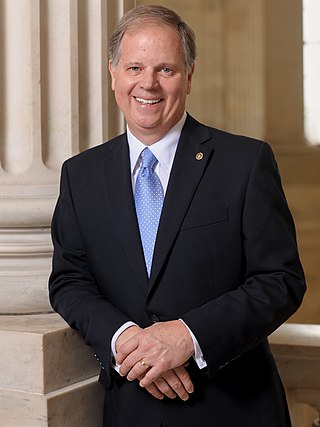
Gordon Douglas Jones is an American attorney and politician who served as a United States senator from Alabama from 2018 to 2021. A member of the Democratic Party, Jones was previously the United States Attorney for the Northern District of Alabama from 1997 to 2001. He is the last Democrat to win and/or hold statewide office in Alabama.

Derek Tai-Ching Kan is an American business executive and government official who has served as a Governor of the United States Postal Service since 2022. He served as deputy director of the Office of Management and Budget between July and December 2020. Kan also served as the under secretary of transportation for policy from 2017 to 2019.
Donald Trump, President of the United States from 2017 to 2021, entered office with a significant number of judicial vacancies, including a Supreme Court vacancy due to the death of Antonin Scalia in February 2016. During the first eight months of his presidency, he nominated approximately 50 judges, a significantly higher number than any other recent president had made by that point in his presidency. By June 24, 2020, 200 of his Article III nominees had been confirmed by the United States Senate. According to multiple media outlets, Trump significantly impacted the composition of the Supreme Court and lower courts during his tenure.
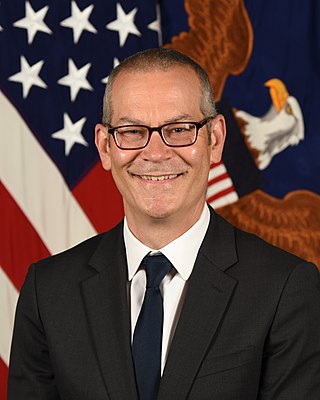
Colin Hackett Kahl is an American political scientist who served as under secretary of defense for policy in the Biden administration from April 28, 2021, to July 17, 2023. Previously, he served as national security advisor to the vice president under then-Vice President Joe Biden (2014–2017). After the Obama administration, Kahl served as a Steven C. Házy Senior Fellow at Stanford University.
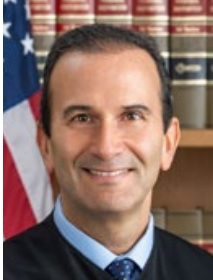
Stanley Blumenfeld Jr. is a United States district judge of the United States District Court for the Central District of California. He formerly served as a judge on the Los Angeles County Superior Court from 2006 to 2020.

Cory Todd Wilson is an American attorney and jurist serving as a U.S. circuit judge of the U.S. Court of Appeals for the Fifth Circuit. He was appointed by President Donald Trump in 2020. A member of the Republican Party, Wilson was previously a judge on the Mississippi Court of Appeals and a member of the Mississippi House of Representatives.

Dilawar Syed is a Pakistani-American businessman, entrepreneur, and government official. He currently serves as deputy administrator of the Small Business Administration. He previously served as Special Representative for Commercial and Business Affairs at the United States Department of State.

